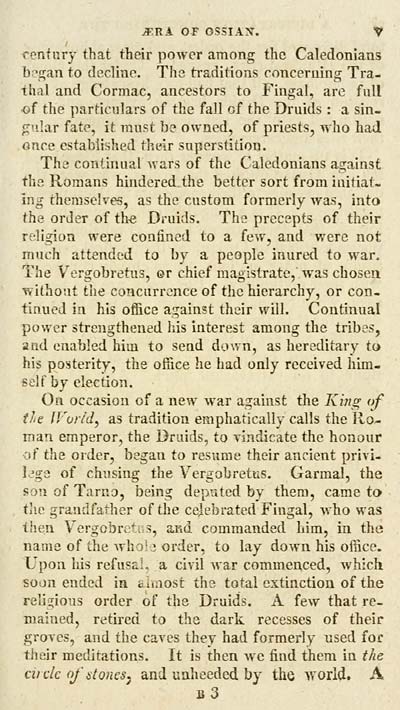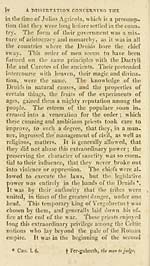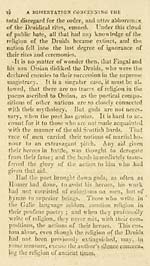Ossian Collection > Poems of Ossian > Volume 1
(23)
Download files
Complete book:
Individual page:
Thumbnail gallery: Grid view | List view

^RA OF GS5IAN. V
rentury that thdr power among the Caledonians
b?gan to decline. The traditions concerning Tra-
thal and Cormac, ancestors to Fingal, are full
of the particulars of the fall of the Druids : a sin-
g'llar fate, it must be owned, of priests, who had
once established their superstition.
The continual wars of the Caledonians against
the Romans hindered the better sort from initiat-
ing themselves, as the custom formerly was, into
the orJer of th-e Druids. The precepts of their
religion were confined to a few, and were not
much attended to by a people inured to war.
The Vergobretus, or chief magistrate, was chosen
without the concurrence of the hierarchy, or con-
tinued in his office against their will. Continual
power strengthened his interest among the tribes,
and enabled him to send down, as hereditary to
his posterity, the office he had only received him-
self by election.
On occasion of a new war against the King of
tie IVorid^ as tradition emphatically calls the Ro-
man emperor, the Druids, to vindicate the honour
of the order, began to resume their ancient privi-
l-^ge of chusing the Vergobretus. Garmal, the
sou of Tarno, being deputed by them, came to
tlie grandfather of the celebrated Fingal, who was
tlien Vergobretus, and commanded him, in the
name of the whol3 order, to lay down his office.
Upon his refusal, a civil war commenced, which
soon ended in almost the total extinction of the
religious order of the Druids. A few that re-
mained, retired to the dark recesses of their
groves, and the caves they had formerly used for
their meditations. It is then we find them in the
ciide of stones^ and unheeded by the world. A
b3
rentury that thdr power among the Caledonians
b?gan to decline. The traditions concerning Tra-
thal and Cormac, ancestors to Fingal, are full
of the particulars of the fall of the Druids : a sin-
g'llar fate, it must be owned, of priests, who had
once established their superstition.
The continual wars of the Caledonians against
the Romans hindered the better sort from initiat-
ing themselves, as the custom formerly was, into
the orJer of th-e Druids. The precepts of their
religion were confined to a few, and were not
much attended to by a people inured to war.
The Vergobretus, or chief magistrate, was chosen
without the concurrence of the hierarchy, or con-
tinued in his office against their will. Continual
power strengthened his interest among the tribes,
and enabled him to send down, as hereditary to
his posterity, the office he had only received him-
self by election.
On occasion of a new war against the King of
tie IVorid^ as tradition emphatically calls the Ro-
man emperor, the Druids, to vindicate the honour
of the order, began to resume their ancient privi-
l-^ge of chusing the Vergobretus. Garmal, the
sou of Tarno, being deputed by them, came to
tlie grandfather of the celebrated Fingal, who was
tlien Vergobretus, and commanded him, in the
name of the whol3 order, to lay down his office.
Upon his refusal, a civil war commenced, which
soon ended in almost the total extinction of the
religious order of the Druids. A few that re-
mained, retired to the dark recesses of their
groves, and the caves they had formerly used for
their meditations. It is then we find them in the
ciide of stones^ and unheeded by the world. A
b3
Set display mode to: Large image | Transcription
Images and transcriptions on this page, including medium image downloads, may be used under the Creative Commons Attribution 4.0 International Licence unless otherwise stated. ![]()
| Early Gaelic Book Collections > Ossian Collection > Poems of Ossian > Volume 1 > (23) |
|---|
| Permanent URL | https://digital.nls.uk/77946569 |
|---|
| Shelfmark | Oss.79 |
|---|---|
| Additional NLS resources: | |
| Attribution and copyright: |
|
| Description | " ... to which are prefixed, 'Dissertations on the aera and poems of Ossian translated by James Macpherson'". |
|---|---|
| Shelfmark | Oss.79-80 |
| Additional NLS resources: | |
| Description | Selected books from the Ossian Collection of 327 volumes, originally assembled by J. Norman Methven of Perth. Different editions and translations of James MacPherson's epic poem 'Ossian', some with a map of the 'Kingdom of Connor'. Also secondary material relating to Ossianic poetry and the Ossian controversy. |
|---|
| Description | Selected items from five 'Special and Named Printed Collections'. Includes books in Gaelic and other Celtic languages, works about the Gaels, their languages, literature, culture and history. |
|---|

